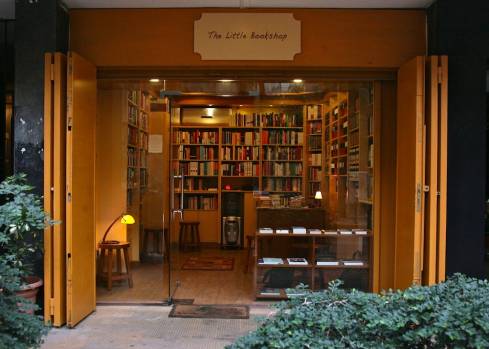Between the Shelves, Hamra’s Little Bookshop Stands Tall Among Giants
The Little Bookshop is a cozy one-room bookstore just a few blocks off Jeanne d’Arc Street with walls colored in a light-orange hue, shelves stacked-to-the-brim with books, and the constant hum of classical music strumming overhead. Adib Rahhal, the owner and sole employee of the bookstore which opened in May 2014, adds to the warmth and charm of the place, always willing to engage in a friendly discussion about literature while offering a coffee or tea to his customers.
It is one of the few English-only bookstores in Lebanon, a deliberate decision based on Rahhal’s personal preference towards English literature and for practicality, due to the bookstore’s limited space. It contains a comprehensive selection of contemporary fiction, classics, poetry, nonfiction, and a smaller section on arts, cinema and music, as well as local magazines such as The Outpost and Rusted Radishes. Rahhal also keeps multiple pocket-sized copies of a “poem-of-the-week” on his desk for anyone interested in picking one up. He hand-picked every single book in the store, telling Beirut.com, “I have wanted to open a bookstore since I was in university… a specialized bookstore, one that is less commercial, less mainstream, and more literary.”

(Image via Melissa Tabeek)
While The Little Bookshop is a haven for print, the popularity of e-books and big commercial bookstore chains are both a looming threat to the tiny shop’s business. One advocate of the transition to e-books is Lebanese blogger Nicolas El-Hayek. In a 2014 blog post, he noted the practicality of finding literature not readily available at most bookstores in the country, as well as the lower cost of digital copies, and the immediacy of attaining the product. To special order a book to Lebanon, a customer could wait weeks to months to receive an order from abroad.
But cause for concern is not pressing, at least at the very moment, as e-books are still not as popular in the Middle East as they are in the West, with Publishers Global citing only two e-book publishing companies in Lebanon. Furthermore, bookstores such as Books and Pens, Virgin Megastore, and Librairie Antoine do not sell e-books at all, and only the latter two sell Kindles, which are not yet in growing demand and have only seen modest sales among university students. As such, Rahhal does not feel threatened by the potential growth of e-books in Lebanon, though he has received suggestions to add e-books to his collection. “While e-books are more practical and you can fit many in one gadget, for the most part my clients are people who prefer actual print books to e-books and digital reading,” he says. He also believes in the value of print books over e-books and doubts the latter can replace the former, a sentiment echoed by many of his customers.
Another more profound challenge The Little Bookshop faces is competition from larger chains such as Virgin Megastore and Librairie Antoine. These stores are both better-known throughout the country and offer a wider selection of literature in English, French and Arabic, rather than in English alone. Furthermore, while The Little Bookshop sits on a quiet street in Hamra, multiple branches of Virgin Megastore and Librairie Antoine are located in bustling streets throughout Lebanon.
Rahhal knows the reality of his humble bookstore amid the dominating behemoths of the book market, but he also doesn’t consider himself in competition with them precisely because of their differences. “We have different concepts of a bookstore: mine is more of a boutique bookshop,” he explains.
Notably, a growing following of loyal customers are drawn to The Little Bookshop because it offers them what both larger, more impersonal bookstores do not: “a little nook in Hamra where you can browse a beautiful collection of books, but also a place where you can just stop by to say hello and have a conversation about literature,” says Azza Al-Masri, an AUB student and former book critic who frequents The Little Bookshop. “You can’t do the same in bigger chains like Virgin Megastore, where you feel like the clerk is more concerned with selling you a best-selling book rather than engaging in a conversation about its merits.”
Though the road may be bumpy for a little bookshop, Rahhal seems up for the challenge. “It’s something I love doing: reading, dealing with books and talking about books with people who love books,” he says, “and I’m very content.”





